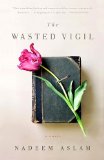Summary | Excerpt | Reading Guide | Reviews | Beyond the Book | Readalikes | Genres & Themes | Author Bio

The ground begins to rise back there gradually until it reaches the sky. The broad chalk line of permanent snow up there, thirteen thousand feet high, is the mighty range of mountains containing the cave labyrinths of Tora Bora.
At the front of the house, a mile along the edge of the lake, is the village that takes its name from the lake. Usha. Teardrop. Thirty miles farther is the city of Jalalabad. Because Lara is Russian, Marcus’s immediate fear regarding her illness was that she had been fed a poison during the hours she had spent waiting for him in Usha, her country having precipitated much of present-day Afghanistan’s destruction by invading in 1979.
In the darkness soon after four a.m. one night, Lara had got out of bed. Accompanied by candlelight she went into the various rooms of the house, moving under that sheath of books, needing movement after the countless hours of being still. She avoided the room where Marcus was but entered others, looking, enclosed within the sphere of yellow light from the flame in her hand. Somewhere very far away a muezzin had begun the call to the prayers of dawn, defined by Islam as the moment when a black thread can just be distinguished from a white one without artificial light.
When enough light began to enter the house, she placed mirrors on the floor to look at the books overhead, though not all of them had been nailed with the titles facing out, and any number of them were in languages she did not possess.
Some years ago, at a point when the Taliban could have raided the house any day, Marcus’s wife had nailed the books overhead in these rooms and corridors. Original thought was heresy to the Taliban and they would have burned the books. And this was the only way that suggested itself to the woman, she whose mental deterioration was complete by then, to save them, to put them out of harm’s reach.
Lara imagined stretching a fishing net at waist level, imagined going to the room directly above and banging her feet until all the books were dislodged and caught without further harm in the net. Marcus said the deep rumble of the B52s had shaken loose every book from one side of a corridor when Tora Bora began to be bombed day and night up there in 2001. The intermittent rain in the whole house had intensified during those weeks in fact.
The Englishman said he had bought the house more than forty years ago, just before he married his wife, Qatrina, who like him was a doctor. “I used to say she brought me Afghanistan in her dowry,” he said. The house was built by an old master calligrapher and painter in the last years of the nineteenth century. He belonged to what was almost the final generation of Muslim artists to be trained in the style of the incomparable Bihzad. When the six-roomed building was complete, the master—who had painted images on the walls of each room—brought to it the woman he wished to make his companion for life. Beginning on the ground floor, each of the first five rooms was dedicated to one of the five senses, and as the courtship slowly progressed over the following weeks, the couple went from one to the next:
The first was dedicated to the sense of sight, and on the walls, among other things, Subha in a dancerly gesture presented her eye to a rogue in the forest.
Allah created through the spoken word, read the inscription above the door that led to the interior about hearing. Here the walls showed singers and musical gatherings, a lute with a songbird sitting on its neck—teaching perhaps, perhaps learning.
From there they moved to the faculty of smell, where angels bent down towards the feet of humans, to ascertain from the odour whether these feet had ever walked towards a mosque. Others leaned towards bellies, to check for fasting during the holy month of Ramadan.
In the room about the sense of touch, there was a likeness of Muhammad with his hand plunged in a jar. He was someone who would not shake hands with women, so in order to make a pact he would put his hand in a vessel containing water and withdraw it, and then the woman would put her hand into the water.
Excerpted from The Wasted Vigil by Nadeem Aslam Copyright © 2008 by Nadeem Aslam. Excerpted by permission of Knopf, a division of Random House, Inc. All rights reserved. No part of this excerpt may be reproduced or reprinted without permission in writing from the publisher.
Your guide toexceptional books
BookBrowse seeks out and recommends the best in contemporary fiction and nonfiction—books that not only engage and entertain but also deepen our understanding of ourselves and the world around us.